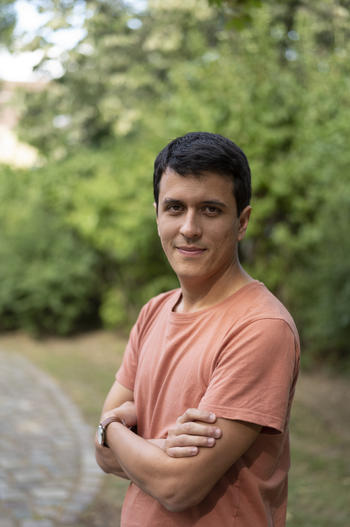Felipe Fernández Lozano

International Research Training Group 'Temporalities of Future in Latin America'
Postdoctoral Fellow
Anthropology
Project: "Lithium, State and the Future in Bolivia. An Anthropology of the Underground"
14195 Berlin
Education
|
06/2018 – 09/2022 |
PhD Candidate in Social and Cultural Anthropology, International Research Training Group ‘Temporalities of Future’, Freie Universität Berlin |
|
10/2015 – 05/2018 |
Master of Arts in Interdisciplinary Latin American Studies, Freie Universität Berlin |
|
10/2011 – 09/2015 |
Bachelor of Arts in History, Freie Universität Berlin |
|
10/2011 – 09/2015 |
Bachelor of Arts in Social and Cultural Anthropology, Freie Universität Berlin |
Work Experience
|
Since 11/2022 |
Postdoctoral Researcher, International Research Training Group ‘Temporalities of Future’ |
|
05/2019 – 10/2022 |
Doctoral Researcher, International Research Training Group ‘Temporalities of Future’ |
|
10/2018 – 02/2019 |
Visiting Scholar, FLACSO, Quito, Ecuador |
|
04/2018 |
Visiting Scholar, Universidad Nacional de San Martín, Buenos Aires, Argentina |
|
09/2017 – 10/2018 |
Fellow Researcher, International Training Research School “Between Spaces”, Freie Universität Berlin |
|
02/2015 – 06/2015 |
Internship, NGO Vallenpaz, Cali, Colombia |
|
10/2015 – 09/2017 |
Student Assistant in the Area of History, Institute for Latin American Studies (Prof. Dr. Stefan Rinke), Freie Universität Berlin |
|
04/2013 – 09/2017 |
Student Assistant at the DFG-funded Research Project “Governance in Areas of Limited Statehood”, SFB 700, Berlin |
Project: "Lithium, State and the Future in Bolivia. An Anthropology of the Underground"
Supervisor:
Prof. Dr. Stephanie Schütze, Freie Universität Berlin
As a key chemical in the contemporary era of energy transition, lithium (Li) has gained an enormous notoriety and it has been brought to the foreground by global politics. The Lithium Triangle (tríangulo del litio), a transnational region close to the Andes mountain range and shared by Bolivia, Chile and Argentina, is believed to contend more than 70% of the world’s lithium reserves. As part of the Triangle, the Salar de Uyuni, an enormous salt flat in the Bolivian highlands, is estimated to have around 21 million tons of lithium, turning the country into the biggest reservoirs of lithium worldwide. Although the state projects to produce and commercialize high amounts of the mineral, the current plant still extracts very low amounts of lithium due to techno-political, natural and managerial conundrums. Hitherto, the mineral still (merely) represents a promise for the future in Bolivia.
In this project, I address the calculations, anticipations, and imaginations around lithium extraction in Bolivia. Through the lens of what I call ‘technologies of anticipation’, I aim to shed light to the professional forecasters as experts in seeing, determining, and calculating underground wealth. By ‘technologies of anticipation’ I refer to technical and political tools such as calculations, mappings, and modellings, but also policy papers and development plans which aim to produce certainty and knowledge on the lithium’s wealth in the underground.
Articles
Fernández, F. (2022). Coping with Extortion. On Violence, Parasites, and Water Infrastructures in Buenaventura, Colombia. Journal of Illicit Economies and Development [in Press]
Fernández, F. (2022). Construir y reparar frente al desabastecimiento: Estado, provisión de agua e infraestructura en Buenaventura, Colombia. Revista Colombiana De Antropología, 58(2), 105–129. https://doi.org/10.22380/2539472X.2125
Reviews
Felipe Fernández (2021). "Under Construction: Technologies of Development in Urban Ethiopia, by Daniel Mains". In: Anthropologica, 63(1).
Felipe Fernández (2018). "Landscapes of Freedom. Building a Postemancipation Society in the Rainforests of Western Colombia, by Claudia Leal". In: H-Soz-Kult, 22.05.2018.
Felipe Fernández (2017). "Erinnerung und Intersektionalität. Frauen als Opfer der argentinischen Staatsrepression (1975-1983) von Verónica Ada Abrego". In: CROLAR Vol. 6, H. 2 (2017): 28-30
MA Thesis
Fernández, Felipe (2019): El Estado líquido. Efectos de gobernanza en Sabaletas, Colombia. Berlin: Freie Universität Berlin. https://refubium.fu-berlin.de/handle/fub188/24581




